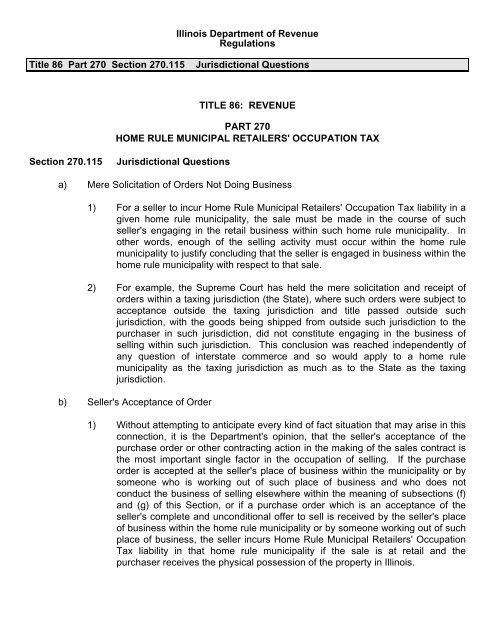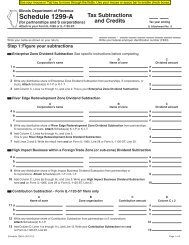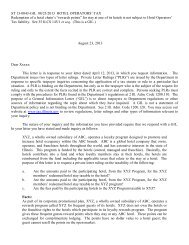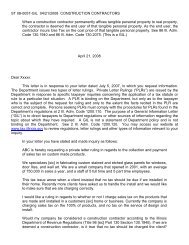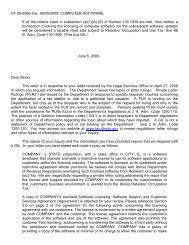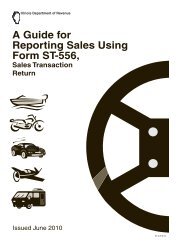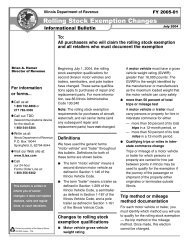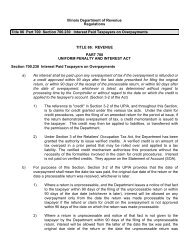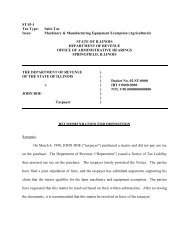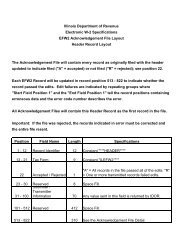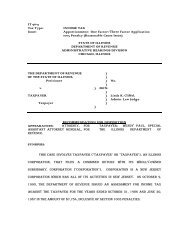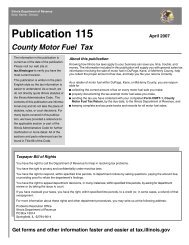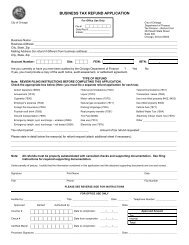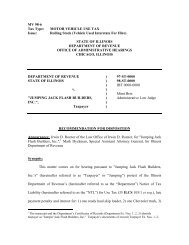270.115 - Illinois Department of Revenue
270.115 - Illinois Department of Revenue
270.115 - Illinois Department of Revenue
Create successful ePaper yourself
Turn your PDF publications into a flip-book with our unique Google optimized e-Paper software.
<strong>Illinois</strong> <strong>Department</strong> <strong>of</strong> <strong>Revenue</strong><br />
Regulations<br />
Title 86 Part 270 Section <strong>270.115</strong> Jurisdictional Questions<br />
TITLE 86: REVENUE<br />
PART 270<br />
HOME RULE MUNICIPAL RETAILERS' OCCUPATION TAX<br />
Section <strong>270.115</strong> Jurisdictional Questions<br />
a) Mere Solicitation <strong>of</strong> Orders Not Doing Business<br />
1) For a seller to incur Home Rule Municipal Retailers' Occupation Tax liability in a<br />
given home rule municipality, the sale must be made in the course <strong>of</strong> such<br />
seller's engaging in the retail business within such home rule municipality. In<br />
other words, enough <strong>of</strong> the selling activity must occur within the home rule<br />
municipality to justify concluding that the seller is engaged in business within the<br />
home rule municipality with respect to that sale.<br />
2) For example, the Supreme Court has held the mere solicitation and receipt <strong>of</strong><br />
orders within a taxing jurisdiction (the State), where such orders were subject to<br />
acceptance outside the taxing jurisdiction and title passed outside such<br />
jurisdiction, with the goods being shipped from outside such jurisdiction to the<br />
purchaser in such jurisdiction, did not constitute engaging in the business <strong>of</strong><br />
selling within such jurisdiction. This conclusion was reached independently <strong>of</strong><br />
any question <strong>of</strong> interstate commerce and so would apply to a home rule<br />
municipality as the taxing jurisdiction as much as to the State as the taxing<br />
jurisdiction.<br />
b) Seller's Acceptance <strong>of</strong> Order<br />
1) Without attempting to anticipate every kind <strong>of</strong> fact situation that may arise in this<br />
connection, it is the <strong>Department</strong>'s opinion, that the seller's acceptance <strong>of</strong> the<br />
purchase order or other contracting action in the making <strong>of</strong> the sales contract is<br />
the most important single factor in the occupation <strong>of</strong> selling. If the purchase<br />
order is accepted at the seller's place <strong>of</strong> business within the municipality or by<br />
someone who is working out <strong>of</strong> such place <strong>of</strong> business and who does not<br />
conduct the business <strong>of</strong> selling elsewhere within the meaning <strong>of</strong> subsections (f)<br />
and (g) <strong>of</strong> this Section, or if a purchase order which is an acceptance <strong>of</strong> the<br />
seller's complete and unconditional <strong>of</strong>fer to sell is received by the seller's place<br />
<strong>of</strong> business within the home rule municipality or by someone working out <strong>of</strong> such<br />
place <strong>of</strong> business, the seller incurs Home Rule Municipal Retailers' Occupation<br />
Tax liability in that home rule municipality if the sale is at retail and the<br />
purchaser receives the physical possession <strong>of</strong> the property in <strong>Illinois</strong>.
2) The <strong>Department</strong> will assume that the seller has accepted the purchase order at<br />
the place <strong>of</strong> business at which the seller receives such purchase order from the<br />
purchaser in the absence <strong>of</strong> clear pro<strong>of</strong> to the contrary.<br />
3) If a purchase order is accepted outside this State but the tangible personal<br />
property which is sold is in an inventory <strong>of</strong> the retailer located within a home rule<br />
municipality at the time <strong>of</strong> its sale (or is subsequently produced in the home rule<br />
municipality), then delivered in <strong>Illinois</strong> to the purchaser, the place where the<br />
property is located at the time <strong>of</strong> the sale (or subsequent production in the home<br />
rule municipality) will determine where the seller is engaged in business for<br />
Home Rule Municipal Retailers' Occupation Tax purposes with respect to such<br />
sale.<br />
c) Some Considerations Which Are Not Controlling<br />
1) Delivery <strong>of</strong> the property within the municipality to the purchaser is not necessary<br />
for the seller to incur Home Rule Municipal Retailers' Occupation Tax liability. It<br />
is sufficient that the purchaser receives the physical possession <strong>of</strong> the property<br />
somewhere in <strong>Illinois</strong> as far as the question <strong>of</strong> delivery is concerned. This is true<br />
because there is no exemption for intercity commerce comparable to the<br />
exemption arising from interstate commerce, and it is not necessary for delivery<br />
to be completed within the home rule municipality for the seller to be regarded<br />
as being engaged in the business <strong>of</strong> selling within such home rule municipality<br />
with respect to that sale.<br />
2) The point at which the tangible personal property will be used or consumed and<br />
the place at which the purchaser resides are also immaterial in determining<br />
whether or not the seller incurs Home Rule Municipal Retailers' Occupation Tax<br />
liability. Furthermore, the place at which the technical sale occurs (i.e., the<br />
place at which title passes) is not a decisive consideration since the phrase in<br />
the municipality in the Home Rule Municipal Retailers' Occupation Tax Act refers<br />
only to the location <strong>of</strong> the occupation <strong>of</strong> selling that is being taxed and not to the<br />
place where sales may be made. (See Standard Oil Company vs. <strong>Department</strong> <strong>of</strong><br />
Finance, et al., 383 Ill. 136 (1934), for a similar problem under the <strong>Illinois</strong><br />
Retailers' Occupation Tax Act.)<br />
d) Place <strong>of</strong> Business Where Long Term or Blanket Contracts are Involved<br />
Under a long term blanket or master contract which (though definite as to price and quantity)<br />
must be implemented by the purchaser's placing <strong>of</strong> specific orders when goods are<br />
wanted, the seller's place <strong>of</strong> business with which such subsequent specific orders are<br />
placed (rather than the place where the seller signed the master contract) will<br />
determine where the seller is engaged in business for Home Rule Municipal Retailers'<br />
Occupation Tax purposes with respect to such orders.<br />
e) Sales Through Vending Machines<br />
The seller's place <strong>of</strong> engaging in business when making sales through a vending machine is<br />
the place where the vending machine is located when such sales are made.
f) Sales From Vehicles Carrying Uncommitted Stock <strong>of</strong> Goods<br />
The seller's place <strong>of</strong> engaging in business when making sales and deliveries (not just<br />
deliveries pursuant to previously accepted orders, but actual sales and deliveries) from<br />
a vehicle in which a stock <strong>of</strong> goods is being carried for sale is the place at which such<br />
sales and deliveries happen to be made -- the vehicle carrying such stock <strong>of</strong> goods for<br />
sale being regarded as a portable place <strong>of</strong> business.<br />
g) Sales <strong>of</strong> Coal or Other Minerals<br />
1) For the purpose <strong>of</strong> determining the local governmental unit whose tax is<br />
applicable, a retail sale, by a producer <strong>of</strong> coal or other mineral mined in <strong>Illinois</strong>,<br />
is a sale at retail at the place where the coal or other mineral mined in <strong>Illinois</strong> is<br />
extracted from the earth. For purposes <strong>of</strong> this Section, “extracted from the earth”<br />
means the location at which the coal or other mineral is extracted from the mouth<br />
<strong>of</strong> the mine.<br />
2) A retail sale is a sale to a user, such as a railroad, public utility or other industrial<br />
company for use. "Mineral" includes not only coal, but also oil, sand, stone<br />
taken from a quarry, gravel and any other thing commonly regarded as a mineral<br />
and extracted from the earth.<br />
3) A mineral produced in <strong>Illinois</strong>, but shipped out <strong>of</strong> <strong>Illinois</strong> by the seller for use<br />
outside <strong>Illinois</strong>, will generally be tax exempt under the Commerce Clause <strong>of</strong> the<br />
Federal Constitution (i.e., as a sale in interstate commerce). This exemption<br />
does not extend, however, to sales to carriers, other than a common carrier by<br />
rail or motor, for their own use outside <strong>Illinois</strong> if the purchasing carrier takes<br />
delivery <strong>of</strong> the property in the home rule municipality and transports it over its<br />
own line to an out-<strong>of</strong>-State destination.<br />
4) A sale by a mineral producer to a wholesaler or retailer for resale would not be a retail<br />
sale by the producer and so would not be taxable. The taxable sale (the retail sale) is<br />
the final sale to the user, and the Home Rule Municipal, Non-Home Rule Municipal or<br />
Home Rule County Retailers' Occupation Tax on that sale will go to the home rule<br />
municipality, non-home rule municipality or home rule county where the retailer is<br />
located.<br />
(Source: Amended at 24 Ill. Reg. 18351, effective December 1, 2000)


